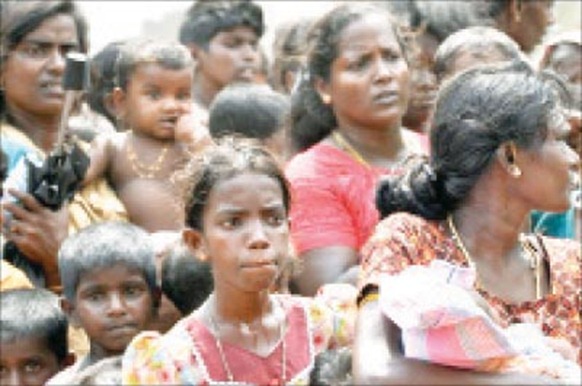By Dinouk Colombage
 The social upheaval caused by the Sri Lankan civil war is being clearly seen through the enormous number of widows living in the North and the East of the island. The government recently released a statistic which stated that there are over 59,000 war widows residing in those regions.
The social upheaval caused by the Sri Lankan civil war is being clearly seen through the enormous number of widows living in the North and the East of the island. The government recently released a statistic which stated that there are over 59,000 war widows residing in those regions.
TNA MP, Suresh Premachandran has vehemently denied this, claiming that the figure stands much higher.
Minister of Child Development and Women’s Affairs, Tissa Karalliyedda, told the media last week that currently there are 59,000 widows in the North and East of Sri Lanka. He explained that of this total figure 42,565 war widows live in the East and a further 16,936 in the North.
Suresh Premachandran, rubbished these figures claiming that in the East alone there are over 45,000 widows. ‘The north suffered through a war for almost thirty years, it is unlikely that the number of widows in these areas is so much lower than the East,’ he said.
Sarvodya, a NGO involved in development and reconstruction, provided The Sunday Leader with facts pertaining to the number of war widows around the country. According to their information, there are in fact 49,000 war widows in the east, 40,000 in the north and 30,000 in the south. Additional Secretary to the Ministry of Child Development and Women’s Affairs, Ashoka Alawatte, explained that often the number of war widows and the total number of widows are recorded together by NGOs. This accounts for the vast differences in the figures presented by the government and the NGO.
Premachandran has accused the government of not only having deflated the actual figure but also of not taking any appropriate action in addressing this growing concern. ‘The government has no plans to ensure their livelihood; many of these women were reliant on their husbands. Now they have no way of earning any money,’ he said. When asked whether the TNA has taken any steps to address this issue? Premachandran explained that the war widow issue alone has not been discussed with the government; however, he added that all talks of reconstruction have stalled. He further stated that ‘not only are these widows affected but they often have children who are dependant on them. This will only increase the number of all those affected’.
Alawatte told The Sunday Leader that the Ministry had setup many programs which would help teach these women to become self-sufficient. She further added that along with these training programs many of the women were undergoing counselling as well. ‘These women are unsure of how to raise families on their own, others have undergone much trauma. It is of vital importance that they are psychologically prepared to take care of their families’.
The Sunday Leader met with Ajanthiya Indraganthi; a war widow from Thirukovil, on the East coast, who was forced to move to Colombo two months ago to be employed as a domestic worker. She explained that her husband had been forcibly recruited by the LTTE during the final stages of the war during which he had been killed. Indraganthi has now been left with two small children.
She described her life to us after having lost her husband during the war. Before he died he used to work in a rubber factory, Indraganthi explained that the pay was ‘nothing too extravagant but we made do’. After he died she was forced to move in with her parents. ‘They are old people, my father had a little money saved up and we were forced to live on that,’ she said. In the last couple of months both of Indraganthi’s children started school and she explained that this has cost them a lot with having to buy books and clothes. ‘Finding work there is very tough, I did not finish school and many places do not hire women’ she added. With funds drying up Indraganthi was finally forced to move to Colombo in the hope of securing employment as a domestic worker. She says that her children are continuing to live with her parents while she sends back money every month. ‘Without my husband around I have to leave my children so that they will have money to get a good education,’ she said as she showed a picture of her youngest son.
When asked whether the government or any of the NGOs had provided any support to her family and other families in similar situations? Indraganthi explained that programs had been setup by NGOs to help women in situations similar to hers. ‘We were all given courses in sewing and farming, however, there were very few places that were willing to hire us. Because jobs were not available I chose to come to Colombo,’ she said. She added that the government had also setup programs but these were only operating in the major towns.
(For updates you can share with your friends, follow TNN on Facebook and Twitter )
